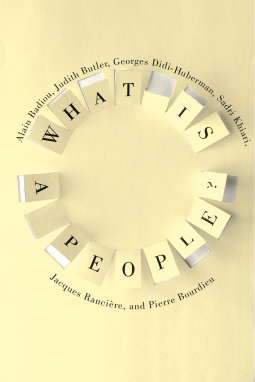
What Is a People?
by Alain Badiou, Judith Butler, Georges Didi-Huberman, Sadri Khiari, Jacques Rancière, Pierre Bourdieu
This title was previously available on NetGalley and is now archived.
Send NetGalley books directly to your Kindle or Kindle app
1
To read on a Kindle or Kindle app, please add kindle@netgalley.com as an approved email address to receive files in your Amazon account. Click here for step-by-step instructions.
2
Also find your Kindle email address within your Amazon account, and enter it here.
Pub Date May 03 2016 | Archive Date Jun 14 2016
Description
These outspoken intellectuals seek to reclaim "people" as an effective political concept by revisiting its uses and abuses over time. Alain Badiou surveys the idea of a people as a productive force of solidarity and emancipation and a negative tool of categorization and suppression. Pierre Bourdieu follows with a sociolinguistic analysis of "popular" and its transformation of democracy, beliefs, songs, and even soups into phenomena with outsized importance. Judith Butler calls out those who use freedom of assembly to create an exclusionary "we." Georges Didi-Huberman addresses the problem of summing up a people with totalizing narratives. Sadri Khiari applies an activist's perspective to the racial hierarchies inherent in ethnic and national categories, and Jacques Rancière comments on the futility of isolating theories of populism when, as these thinkers have shown, the idea of a "people" is too diffuse to support them. By engaging this topic linguistically, ethnically, culturally, and ontologically, these scholars help separate "people" from its fraught associations to pursue more vital formulations.
Alain Badiou is René Descartes Chair at the European Graduate School and teaches at the École Normale Superieure and the Collège International de Philosophie in Paris.
Judith Butler is the Maxine Eliot Professor in the Departments of Rhetoric and Comparative Literature, University of California, Berkeley.
Georges Didi-Huberman is professor at the Centre d’Histoire et Théorie des Arts at the École des Hautes Études en Sciences Sociales.
Sadri Khiari is a Tunisian activist who has lived in exile in France since 2003 and is active in Indigènes de la République (Movement of the Indigenous of the Republic).
Jacques Rancière is professor of philosophy emeritus at the University of Paris VIII.
Pierre Bourdieu (1930–2002) served as chair of sociology at the Collège de France.
Advance Praise
Available Editions
| EDITION | Hardcover |
| ISBN | 9780231168762 |
| PRICE | $24.00 (USD) |
Links
Average rating from 4 members
Readers who liked this book also liked:
We Are Bookish
Arts & Photography, Health, Mind & Body, OwnVoices
We Are Bookish
Multicultural Interest, Mystery & Thrillers, Teens & YA
We Are Bookish
General Fiction (Adult), Literary Fiction, Women's Fiction
We Are Bookish
Multicultural Interest, OwnVoices, Teens & YA
We Are Bookish
General Fiction (Adult), Romance, Women's Fiction
We Are Bookish
General Fiction (Adult), Romance, Women's Fiction
We Are Bookish
Mystery & Thrillers, OwnVoices, Teens & YA
We Are Bookish
Biographies & Memoirs, Nonfiction (Adult), Parenting, Families, Relationships
We Are Bookish
Literary Fiction, Multicultural Interest, Women's Fiction
We Are Bookish
Historical Fiction, Mystery & Thrillers, Teens & YA
We Are Bookish
Business, Leadership, Finance, Nonfiction (Adult), Self-Help


















